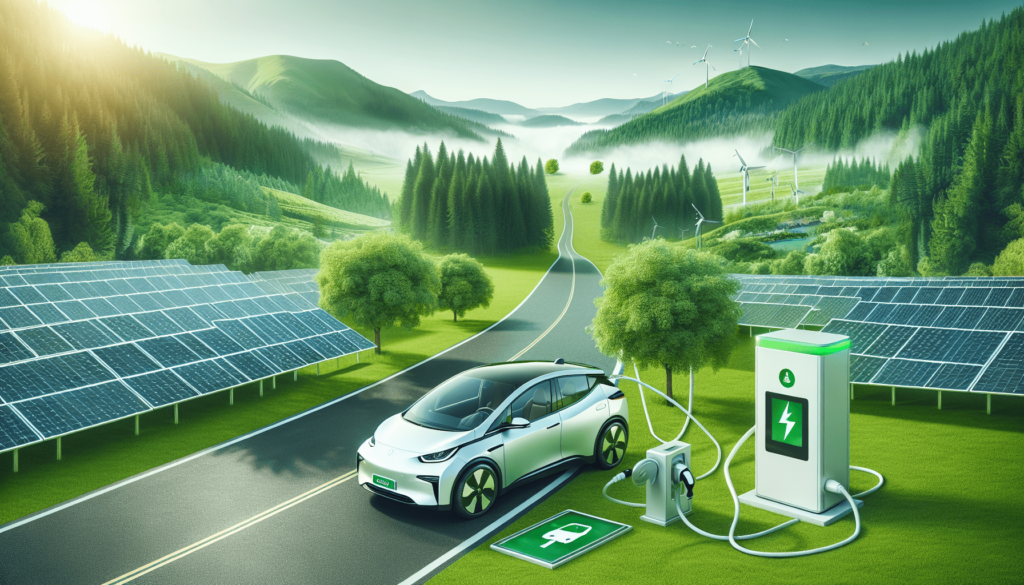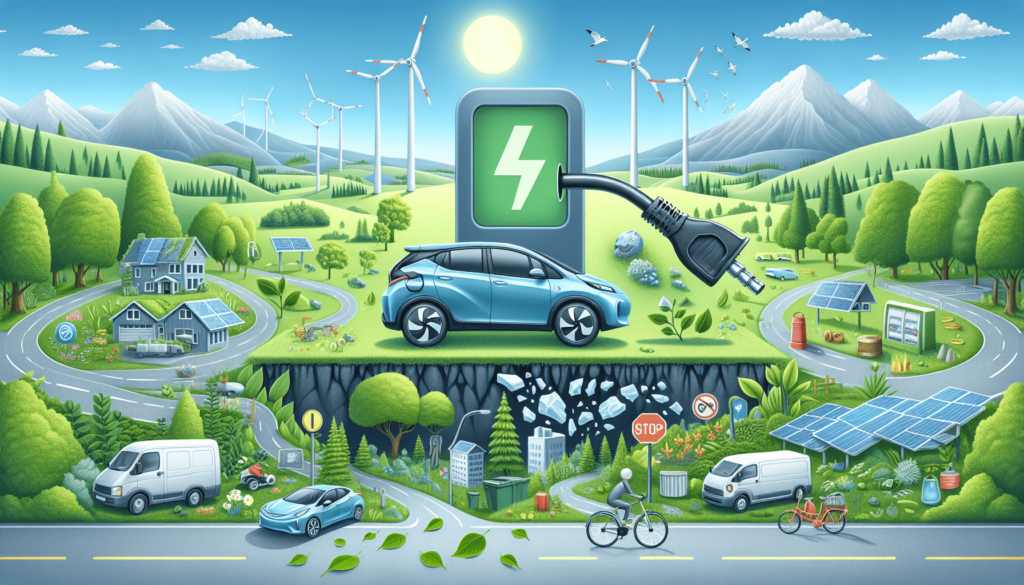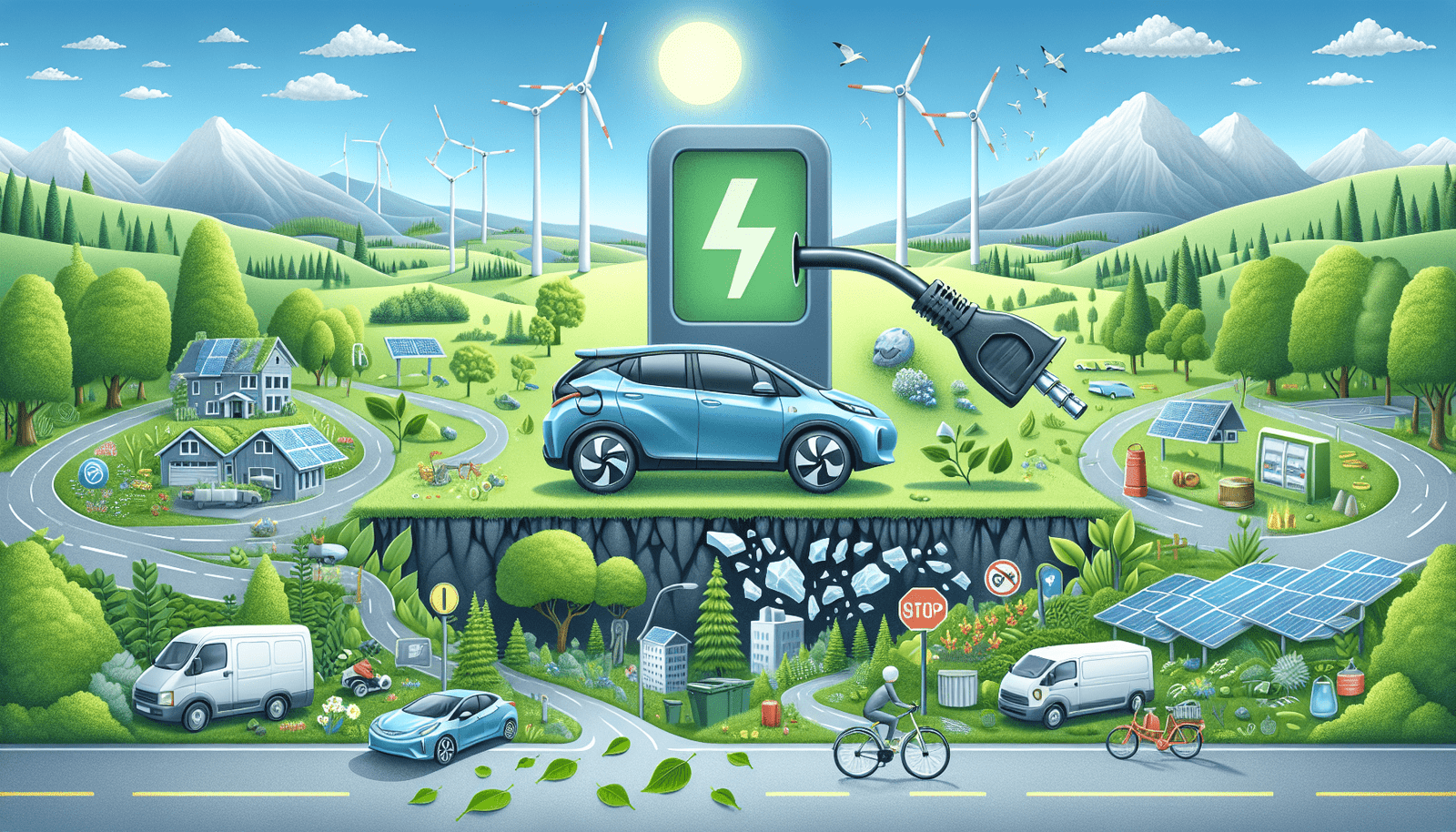Imagine a world where the hum of engines is replaced by the gentle hush of electric motors, and the air we breathe is free from the choking exhaust fumes of traditional vehicles. That future might be closer than we think, thanks to the long-term environmental benefits of electric vehicles (EVs). By eliminating tailpipe emissions and reducing greenhouse gas emissions, EVs have the potential to greatly improve air quality and combat climate change. But that’s not all. Join us as we explore the various ways in which EVs contribute to a greener, more sustainable future.
1. Reduction in greenhouse gas emissions
Lower carbon dioxide emissions
One of the major environmental benefits of electric vehicles (EVs) is the reduction in greenhouse gas emissions, particularly carbon dioxide (CO2). Unlike conventional vehicles that run on fossil fuels, EVs are powered by electricity, which can be generated from renewable energy sources such as solar, wind, or hydroelectric power. By using clean electricity to charge their batteries, EVs emit little to no CO2 during operation. This reduction in CO2 emissions helps to mitigate climate change and decrease the overall carbon footprint of transportation.
Reduced air pollution
In addition to lowering CO2 emissions, electric vehicles also contribute to a significant reduction in air pollution. Traditional vehicles that rely on gasoline or diesel produce harmful pollutants such as nitrogen oxides (NOx) and particulate matter (PM). These pollutants are known to have detrimental effects on human health, leading to respiratory problems and other related illnesses. However, with zero tailpipe emissions, EVs do not release these pollutants into the air, improving air quality and creating cleaner and healthier environments.
2. Decreased reliance on fossil fuels
Less dependence on oil
By transitioning to electric vehicles, societies can reduce their dependence on fossil fuels, particularly oil. Conventional vehicles heavily rely on gasoline or diesel, both of which are derived from crude oil. The oil industry has significant environmental impacts, including habitat destruction, water pollution, and oil spills. EVs, on the other hand, rely on electricity from renewable sources, thereby reducing the demand for oil and minimizing the associated environmental damages.
Energy diversification
Another advantage of electric vehicles is their ability to diversify the energy sources used for transportation. While traditional vehicles predominantly run on gasoline or diesel, EVs can be charged from various energy sources, including solar, wind, and hydroelectric power. This energy diversification not only promotes sustainability but also enhances energy security, as countries become less dependent on imported fossil fuels.
Reduced oil spills
Oil spills have devastating effects on ecosystems and wildlife, causing long-term damage to marine environments. By reducing the consumption of oil, electric vehicles help mitigate the risk of oil spills during extraction, transportation, and refining processes. This not only protects aquatic life but also preserves the natural beauty of our oceans, lakes, and rivers.

3. Improved air quality
Lower levels of particulate matter
Electric vehicles contribute to improved air quality by significantly reducing the levels of particulate matter (PM) in the atmosphere. PM, which consists of tiny airborne solid particles and liquid droplets, is linked to various health problems, including asthma, respiratory issues, and even premature death. Unlike internal combustion engine vehicles that emit PM through the combustion of fuels, EVs produce zero tailpipe emissions, effectively minimizing the release of harmful particles into the air.
Decreased nitrogen oxide emissions
Electric vehicles also help decrease nitrogen oxide (NOx) emissions, which are major contributors to air pollution. NOx is produced by the combustion of fossil fuels and is a primary cause of smog, acid rain, and respiratory diseases. By utilizing electric motors instead of combustion engines, EVs eliminate the direct emission of NOx, significantly improving air quality and reducing the negative impact of transportation on the environment and public health.
Reduced smog formation
Electric vehicles play a vital role in reducing the formation of smog, which is harmful to both humans and the environment. Smog is primarily composed of ground-level ozone, a pollutant that can cause respiratory problems, eye irritation, and lung damage. By emitting zero tailpipe pollutants, EVs help to decrease the precursor gases that contribute to smog formation, leading to cleaner and healthier air in urban areas.
4. Decreased noise pollution
Quieter electric vehicles
Electric vehicles are notably quieter compared to their internal combustion engine counterparts, resulting in a significant decrease in noise pollution. Traditional vehicles are known for their loud engines, tire noise, and exhaust systems, which contribute to noise pollution in urban areas. However, EVs operate with electric motors that produce minimal noise, creating a quieter and more peaceful environment for both drivers and pedestrians.
Improved quality of life for urban dwellers
The reduction in noise pollution brought about by electric vehicles can greatly enhance the quality of life for urban dwellers. Noise pollution has been linked to various health issues, including stress, sleep disturbances, and cardiovascular problems. By transitioning to electric vehicles, cities can create quieter living spaces, improve the well-being of their residents, and promote a more harmonious coexistence between people and their environment.
5. Energy efficiency
Higher energy conversion efficiency
Electric vehicles are known for their high energy conversion efficiency compared to internal combustion engine vehicles. Electric motors are much more efficient in converting energy into kinetic power, with an average efficiency of 80-90%. In contrast, internal combustion engines typically have an efficiency range of 20-30%. This higher energy conversion efficiency translates to less wasted energy, reducing the overall energy consumption required for transportation.
Reduced energy waste
The energy efficiency of electric vehicles also leads to reduced energy waste during operation. Unlike conventional vehicles, which generate excess heat and energy losses through the combustion process, electric vehicles convert energy directly from electricity to motion. This eliminates the need for energy-consuming cooling systems and reduces the overall energy waste associated with traditional vehicles. By minimizing energy waste, EVs contribute to a more sustainable and efficient transportation system.
6. Renewable energy integration
Promotion of renewable energy sources
Electric vehicles go hand in hand with the promotion of renewable energy sources. As countries transition to electric transportation, there is a growing emphasis on developing and utilizing renewable energy technologies such as solar, wind, and hydroelectric power. The increased demand for electricity to charge EVs encourages the expansion of renewable energy infrastructure, creating a more sustainable and clean energy future.
Stabilization of energy grid
The integration of electric vehicles into the energy grid has the potential to stabilize and balance the electricity supply-demand dynamics. With smart charging technologies, EVs can be charged during off-peak hours or when renewable energy generation is at its peak. This not only optimizes the utilization of renewable energy sources but also helps mitigate the challenges associated with intermittent renewable energy production. By acting as mobile energy storage units, electric vehicles contribute to a more stable and resilient energy grid.
7. Resource conservation
Reduced consumption of raw materials
Electric vehicles offer significant opportunities for resource conservation through reduced consumption of raw materials. Traditional vehicles require large amounts of steel, aluminum, and other materials during the manufacturing process. In contrast, electric vehicles have simplified drivetrains and fewer moving parts, resulting in lower material requirements. Additionally, advancements in battery technology are reducing the amount of rare and precious metals needed for electric vehicle batteries, further minimizing the demand for scarce resources.
Extended lifespan of batteries
Electric vehicle batteries have the potential for extended lifespans through various recycling and second-life applications. While the performance of batteries may degrade over time, they can still serve other purposes even after their useful life in a vehicle. For example, used EV batteries can be repurposed for stationary energy storage systems or integrated into renewable energy projects. By maximizing the lifespan of batteries, electric vehicles contribute to the efficient utilization of resources and reduce the environmental impact of battery production.
Efficient recycling programs
The rise of electric vehicles has prompted the development of efficient recycling programs for batteries and other components. Recycling electric vehicle batteries helps recover valuable materials such as lithium, cobalt, and nickel, which can be used to manufacture new batteries or other electronics. Proper recycling of components also minimizes the environmental impact of disposing of electric vehicle waste. By establishing comprehensive recycling programs, the environmental footprint of electric vehicles can be further reduced.
8. Water conservation
Reduced water usage in vehicle production
Electric vehicles offer water conservation benefits throughout their lifecycle, starting with reduced water usage during vehicle production. Manufacturing conventional vehicles, particularly in the automotive industry, requires significant amounts of water for various processes such as metal shaping, painting, and assembly. On the other hand, electric vehicle production tends to have lower water requirements due to the simplified manufacturing processes and reduced reliance on certain materials. By transitioning to electric vehicles, societies can lessen their water consumption and promote more sustainable manufacturing practices.
Decreased water pollution
The reduced reliance on fossil fuels and conventional vehicles directly contributes to decreased water pollution. Oil spills, leaks, and runoff from fueling stations and transportation activities contaminate water sources, endangering aquatic ecosystems and compromising the quality of drinking water. With electric vehicles, the potential for water pollution from these sources is significantly reduced, resulting in cleaner and healthier waterways for both humans and wildlife.

9. Reduction in noise pollution
Quieter roadways
Electric vehicles, with their quiet operation, contribute to quieter roadways and a reduction in noise pollution. Traditional vehicles, particularly those with internal combustion engines, produce high levels of noise from engine rumbling, exhaust systems, and tire friction. In urban areas, noise pollution from road traffic can negatively impact the well-being of residents and disrupt the natural soundscapes. By transitioning to electric vehicles, communities can create calmer and more peaceful road environments, enhancing the overall quality of life.
Enhanced wildlife habitats
The reduction in noise pollution brought about by electric vehicles has positive implications for wildlife habitats. Noise pollution from road traffic can disrupt natural habitats, hinder mating calls, and disturb wildlife behavior patterns, ultimately affecting biodiversity. By reducing noise levels along roadways through the adoption of electric vehicles, we can create more favorable conditions for wildlife, enabling them to thrive and preserving essential ecological balances.
10. Economic benefits
Job creation in the EV industry
The shift towards electric vehicles brings about significant economic benefits, including job creation. As the demand for electric vehicles increases, there is a need for skilled workers in various sectors such as manufacturing, engineering, research and development, and renewable energy. The EV industry has the potential to generate numerous sustainable job opportunities, fostering economic growth and driving innovation in clean technologies.
Decreased healthcare costs due to improved air quality
The environmental benefits of electric vehicles, particularly the reduction in air pollution, have direct healthcare cost implications. Air pollution is associated with numerous health issues, including respiratory diseases, cardiovascular problems, and premature deaths. By improving air quality through the adoption of electric vehicles, healthcare costs can be substantially reduced. Fewer cases of pollution-related illnesses translate to lower medical expenses, creating economic savings and promoting public health and well-being.
In conclusion, electric vehicles offer a wide range of long-term environmental benefits that contribute to a cleaner, greener, and healthier future. From the reduction in greenhouse gas emissions and improved air quality to decreased noise pollution and resource conservation, the advantages of electric vehicles extend far beyond their energy-saving potential. With ongoing advancements in technology and the expansion of renewable energy sources, the transition to electric vehicles is becoming increasingly feasible and imperative for mitigating the negative impacts of transportation on the environment. By embracing electric vehicles, we can pave the way for a sustainable transportation system that prioritizes the well-being of our planet and future generations.


